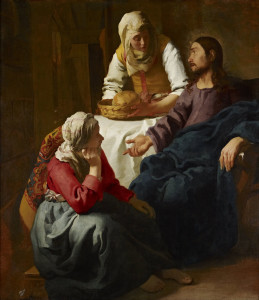Thoughts on Today’s Lessons for July 17, 2016

Christ in the house of Mary and Martha. Oil painting by Johannes (Jan) Vermeer, 1665, National Gallery of Scotland.
Last week we heard the prophet Amos angrily warning Israel’s king and high priest of the terrible fate that would fall on them and their families if they continued to be unjust. Now he recites a horrifying litany of curses that will come to the land whose rulers “trample the needy and bring to ruin the poor.” Let the land tremble and its people mourn as the sun goes dark and crops fail. The people will hunger and thirst for God’s words as they do for food and water, but they will not find them.
First Reading (Track Two): Genesis 18:1-10a
Genesis, the first book of the Bible, begins with our ancestral legend of the Creation, and continues with the familiar stories: Cain and Abel, the Tower of Babel, and Noah and the flood (which has been much in the news in Kentucky this week!) Today we read how the story of the chosen people begins, as God, speaking through three mysterious strangers who receive the patriarch Abraham’s open hospitality, tell him that he and his wife Sarah, despite their age, will have a son, and their offspring will inherit the Promised Land.
A song perfectly tuned to harmonize with our first reading, this Psalm angrily accuses an unnamed tyrant (perhaps, according to tradition, Doeg the Edomite, who conspired with Saul to kill King David) who “trusted in great wealth,” a liar who loved evil more than good. May God demolish the tyrant, the Psalmist shouts; wicked people who steal from the poor will fail, while those who trust in God’s eternal mercy will live in joy.
Psalm (Track Two): Psalm 15
Our first reading described the beginning of God’s covenant with the people. Our Psalm lays out the covenant’s fundamental premises. Who may come to the holy hill and reside in God’s tabernacle? We hear a long list of right actions: Do what is right. Don’t slander. Don’t do wrong by our friends or harm the innocent. These are simple commands. Although they may be difficult to live in full, they guide us into a life of righteousness.
Second Reading: Colossians 1:15-28
It is not always easy to decipher the sometimes dense prose of Paul and those who wrote letters in his name. It may help to recognize them as direct advice to a congregation – a sermon in letter form – blending both theological reflection and practical advice. After a theological meditation on Christ as image of the invisible God who made peace through his sacrifice, the author tells us that in becoming a servant of the gospel, he became a servant of the church. As a busy servant, he might remind us of Martha in today’s Gospel. But his call to reconcile ourselves to Christ and proclaim Christ’s supremacy might make us think of Mary.
Gospel: Luke 10:38-42
Jesus has stopped at the home of his friends Martha and Mary, and we hear the familiar story of the two women who show us very different interpretations of neighborly love. Martha gets busy, eager to ensure that everything is just right. Mary does no work, to Martha’s frustration. She chooses instead to sit at Jesus’ feet, listening, learning and loving. Both practice hospitality, and many of us might recognize some of ourselves in both sisters. Note well, though, that Jesus tells Martha that her sister has chosen the better part.
